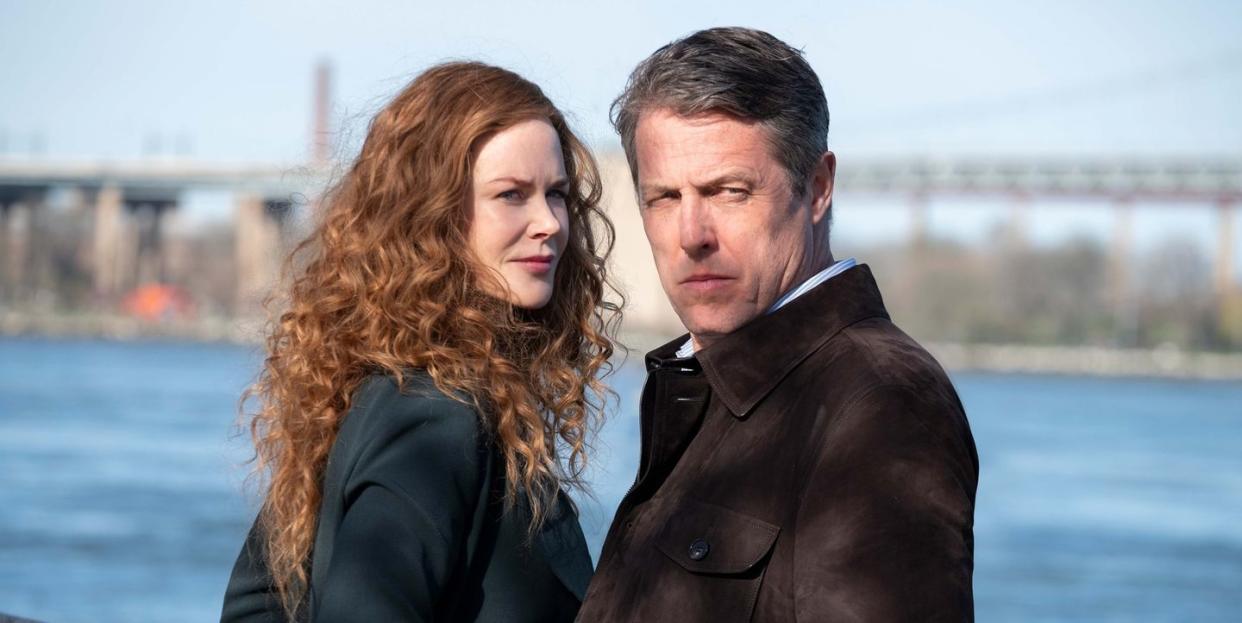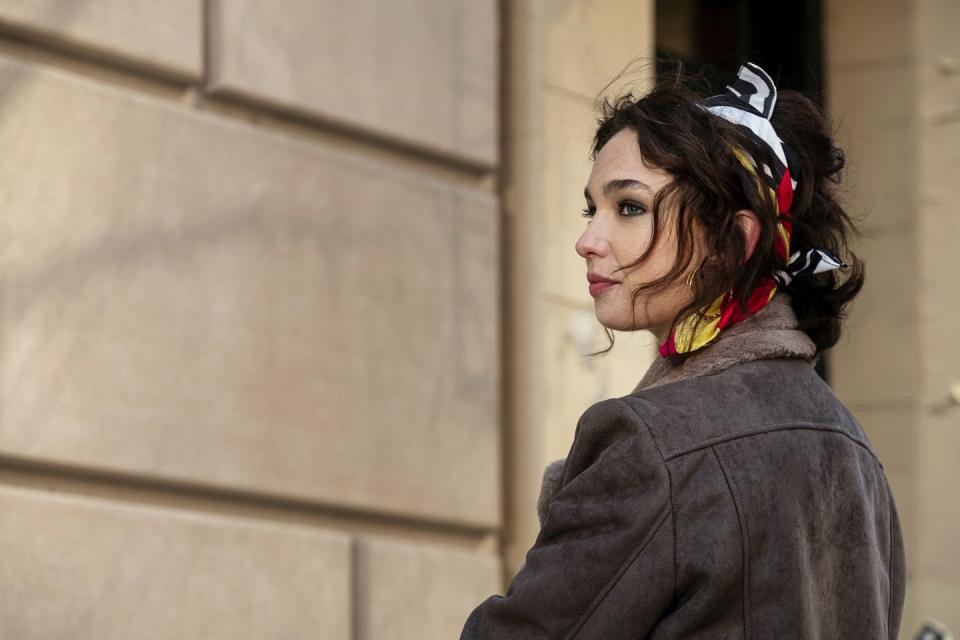The Book That Inspired "The Undoing" Won't Give Away Any Major Secrets

The Undoing, a riveting new HBO miniseries starring Nicole Kidman and Hugh Grant, is based on the book You Should Have Known by Jean Hanff Korelitz.
However, The Undoing deviates from the book's plot after the first two episodes.
This is how The Undoing compares to the book that inspired it.
Warning: This post contains spoilers for The Undoing.
If you're craving stories of secrets kept among the upper crust, then The Undoing is the best thing on HBO since Big Little Lies. Out October 25, The Undoing is the story of Grace Fraser (Nicole Kidman, reunited with her curly hair), a psychologist whose world falls apart when her husband, Jonathan (Hugh Grant), is linked to the death of a Elena Alves (Matilda De Angelis), a fellow parent at Reardon, their children's fictional private school in Manhattan.
Like Big Little Lies, the series stars Kidman and was adapted from a novel by David E. Kelley. Unlike Big Little Lies, though, the novel won't necessarily give away the show's ending. Only the first two (of six) episodes of The Undoing follow closely to You Should Have Known, a richly drawn 2014 psychological thriller by Jean Hanff Korelitz.
Using the characters and premise found in the novel, The Undoing goes on its own path. "The best you can do with a good book, if you want to dramatize it on screen, is do something else with it," Susanna Bier, who directed all eight episodes, tells OprahMag.com. "By doing that you maintain the actual qualities of the book. But you create something that is possibly different and something in its own right."
While veering away from the book's specifics, The Undoing preserves its feeling of destabilization. You Should Have Known is written in close third-person, and ekes hundreds of pages by analyzing a compact time period: The days in which Grace's cozy assumptions about her marriage and her husband's character crumble, and she's forced to rebuild.
The Undoing creates a similar mood of destabilization as Grace fact checks her way through a personal crisis. "One of the main things I set out to do was, How do I—with cinematic language—tell the story of discombobulation? How do I tell the story of confusion? Of chaos? Of your world falling apart, but you still need to function and seem to function? How do I tell that visually, and in a palatable way for an audience?" Bier asks. She adds that she was excited to have the opportunity to tell a murder mystery, as well as to have the ability to "venture into somebody's state of mind."
The result is many moments of Kidman walking around Manhattan in extravagant, colorful coats, her enigmatic expression masking a bone-deep confusion. Like Grace, audiences might overlook certain facts in The Undoing. We'll be kept guessing until the final episode, since no answers will be found in the book. Here are the major differences between The Undoing and the book that inspired it.
In the book, Grace (ironically) is the author of a book of marital advice.
When Korelitz's books opens, Grace Sachs, a successful therapist, is about to go on a press tour for her book, also titled You Should Have Known. After years working with countless unhappily married women, Grace has developed a harsh and severe philosophy: They got themselves into these situations willingly, by overlooking qualities about their partners. In short, they should have known.

"Listening to them, I continually thought: You knew right at the beginning. She knows he’s never going to stop looking at other women. She knows he can’t save money. She knows he’s contemptuous of her—the very first time they talk to each other, or the second date, or the first night she introduces him to her friends. But then she somehow lets herself unknow what she knows. She persuades herself that something she has intuitively seen in a man she barely knows isn’t true at all now that she—quote unquote—has gotten to know him better. And it’s that impulse to negate our own impressions that is so astonishingly powerful," Grace says, during the book's opening scene, an interview with a journalist.
Ironically, when facts about her husband are revealed, Grace ends up being in the same position as her patients. Her earlier words sound unthinkably smug. So instantly infatuated by Jonathan at the age of 21, Grace overlooked important details. Now, with her husband missing and a woman named Malaga dead (called Elena in the show), those details turn out to be red flags. Her patients should have known—and so should she.
Jonathan never appears in the novel.
If The Undoing were a conventional adaptation of Korelitz's novel, there would be no Hugh Grant. Jonathan is missing for the entire book, appearing only in Grace's memories. He's the Rebecca of You Should Have Known—a person that haunts the book's characters with his absence.
With Jonathan gone, Grace and her son, Henry (Noah Jupe), are forced to grapple with the aftermath of his actions alone. They escape from the tabloid coverage at her family's rustic country home in Connecticut (they're not quite as rich in the book as they are in the show), and ultimately begin anew there.
Jonathan's absence also functions as a neat metaphor for his character: He was an empty shell, able to conform to what others wanted him to be—as long as it served him. He never really cared about other people; not his wife, nor their son, nor his cancer patients (he's a pediatric oncologist). His physical absence mirrors a previous emotional absence.

The ending of You Should Have Known identifies the killer.
After skipping town at the beginning of the novel, secrets about Jonathan's life unfurl. He had a history of aggression at work, and was ultimately let go from his position at the hospital. He also had a history of infidelity, including with other hospital staff members.
But here's the most important revelation: Jonathan had an affair with Malaga Alves (called Elena in the show), the parent of Miguel, a patient of his. Malaga got pregnant and had Jonathan's child. Jonathan paid for Miguel to attend Reardon, and borrowed money from Grace's father to do so. When Malaga revealed she was pregnant again, Jonathan impulsively killed her, fearing his secret life would intrude into his carefully manicured one with Grace.

The novel suggests that Jonathan was a sociopath, acting without conscience and immune to remorse. Years earlier, he had cut off all ties with his family in Long Island (he's not British in the book). In the end, his estranged family in Long Island takes in the daughter that he fathered with Malaga, who is named Elena, and rebuilds a relationship with Henry.
Ultimately, Jonathan is apprehended, and arrested. The news doesn't shake Grace and her son from their new life in Connecticut, where they relocate permanently. There, Grace finds a more supportive community than the competitive atmosphere in Manhattan, reuniting with a childhood friend, who had never liked Jonathan, and beginning a new romance.
The incident didn't ruin her career, either: She plans to revise her book with her experiences, and in turn write a more relatable and honest book of advice. Ideally, people know who they're marrying—but as Grace's extreme story demonstrates, there are always surprises.
For more ways to live your best life plus all things Oprah, sign up for our newsletter!
You Might Also Like
